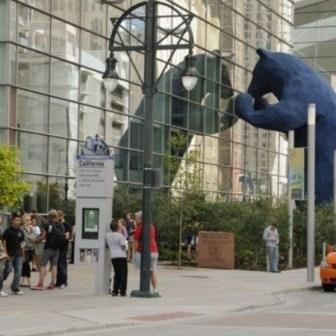What I Took Back to Malawi

[media-credit name=”Downtown Denver Partnership” align=”alignnone” width=”300″] [/media-credit]
[/media-credit]
- A view of the 16th Street Mall in Denver, Colorado.
One would have expected the recent U.S. government shutdown to have shaped this piece, but surprisingly it didn’t.
I initially thought I would write about how lopsided the news media in America is and how I now strongly believe that it is the media that has shaped Africa’s “single story” as a sort of impoverished version of the Flintstones.
It would have been easy to use this as an anecdote for how isolated America, and its Americans, is from the real Africa. It would have been a great blog to write – “Blame it on the media for the ‘single story!’”
But haven’t we heard it all before?
I actually contemplated writing about one interesting group of Americans – those of the Tea Party – but sadly I never got the chance to meet any during my journey. I think by the time I would have come up with something to say about them, they probably would have already enjoyed their 15 minutes of infamy and all the jokes about their warped sense of the universe would have become “yesterday’s news.”
No, these things haven’t stuck with me. Funny enough, my memory of America has more to do with little moments that resonated with me. These are the things I will remember.
I will remember the Denver weather that would shift like an American politician: warm and inviting, like its citizens, in the mornings, offering a clear skyline dominated by the snow-capped Rocky Mountains in the distance. Then the bitter stone-cold would sneak up on you with stubborn temperatures that were, for lack of a better word, un-African.
I will remember being acutely aware of checking whether the cardboard characterizations of African Americans in the books I had read and films I had watched were actually real. Gladly, many of the African Americans I met seemed like they came right off the pages of an Apple Mac-typed, Xerox-printed script of the Cosby Show. And Like the Cosby’s, they were intelligent, warm and some of the best conversationalists (and jokers) I have met in years.
I will remember how mothers and fathers seemed to have in-depth conversations with their under-5-year-old children. From afar it seemed like they were trying to negotiate a ceasefire between Israel and Palestine.
A case in point was a mother I observed one day who was with her probably 3-year-old daughter as they walked along a North Carolina Street. I eavesdropped on their conversation, curious as to what exchange of words could possibly make a pensive face of a 3 -year-old girl, and what struck me was a question the mother asked of her daughter:
“If we are to be efficient, we should go straight to the toys section of that shop – what do you think?” As the mother and daughter sauntered along taking with them the mystery answer to that question, I found myself wondering whether the girl even understood what the word “efficient” meant. Does she even grasp the concept of what being efficient is? Is she old enough to be consulted for her opinion?
I will also remember what must be the most original (unpatented) theory ever to come from an African sojourner in a foreign land, or so I’d like to think. I noticed that as you move farther away from the East Coast of America, the pace of conversation slows down as well. I could easily understand Coloradans, but I had to strain to decipher what the New Yorkers and Chicagoans were trying to say, which produced some frustrating results.
If this theory were to be expressed as a mathematical equation, so that all those years studying math would be put to some use, it would probably look like this:
Pace of Language ∝
|
1 |
| Distance from East Coast |
Whether the formula above applies to pace of life is something for another pointless, but intriguing, social study.
I will remember arriving in New York and noticing the grime in the bathrooms and the warning posters of theft all around the arrivals terminal. I felt a tingle of that same fear, the one I had when coming to America, trying to massage me back to that dark place of suspicion and paranoia. It failed.
But I couldn’t shake off the realization that, as I stared through the airport doors at the famous yellow cabs outside, my “single story” America was beyond those doors and a part of me let off a sigh of relief that I was only passing through this place.
I will remember a brief but revealing conversation I had with a proud American woman that went something like this:
Me: are you going to St. Thomas for a holiday?
Woman: No! I am going to St. Thomas for vacation.
I will remember while walking down the streets of downtown Denver, its streets punctuated with marijuana shops, when I noticed a beggar rummaging through a garbage bin for food. I was carrying a takeaway box that contained the remnants of a delicious Thai cuisine that I had hoped to consume that evening. Touched by the sight of the beggar, I left the takeaway box on the garbage bin and whispered “There you go buddy” as he looked up at me from his rummaging.
As I walked away, I heard the unmistakable thud of the takeaway box landing on the concrete pavement. I turned around to see the box, unopened, on the pavement and the beggar continuing his rummaging.
I didn’t make anything of it at the time, but now I wonder: did the box simply fall to the ground? Or did the beggar, Caucasian, knock it away in accordance with some other unwritten laws that taught him that – even in his state of desperation – he shouldn’t accept help from a black man. I hope for the former. Hoping is still legal and politically correct.
